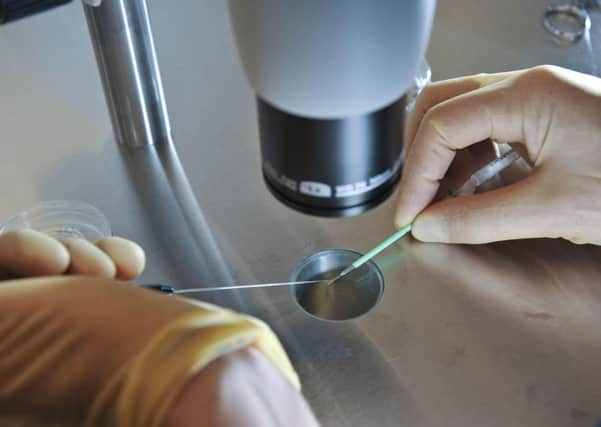Scientists hail world-first cancer breakthrough in Sheffield


The treatment is being described as a milestone in the development of next-generation targeted medicines for cancer, with work underway to find out if it can tackle other cancers.
The science behind the drug Lynparza was uncovered by experts at Sheffield University a decade ago. Now patents from their work will continue to finance further studies in the field, as well as provide valuable extra income for the charity Yorkshire Cancer Research which funded the research.
Advertisement
Hide AdAdvertisement
Hide AdThe drug is targeted at women with a form of ovarian cancer linked to the inherited gene mutations BRCA2, which makes them more likely to develop the illness, accounting for up to 15 per cent of all cases.
Developed by pharmaceutical giant AstraZeneca, it has been approved by regulators in Europe and the United States for use to extend the lives of women with advanced BRCA2-related ovarian cancer. The National Institute for Health and Care Excellence is expected to rule later this year on its availability on the NHS.
Research is being carried out to find out if it could also help patients with breast, pancreatic and gastric cancers.
Charles Rowett, chief executive officer of Yorkshire Cancer Research, said: “We are incredibly proud that a treatment discovered in Yorkshire with funding from our charity, then developed with the help of big pharma, is now one step closer to the patient.
Advertisement
Hide AdAdvertisement
Hide Ad“It’s extremely rewarding to know that we have made a difference to the lives of people not only in Yorkshire, but across the world.
“The journey from lab to patient can be long, complicated and uncertain, so a successful outcome is a very exciting achievement.
“Not only this, but the financial benefits which flow from our original investment will undoubtedly have a huge benefit to our future mission to help more people avoid, survive and cope with cancer.”
The drug blocks the capacity of cancer cells to repair themselves.
Advertisement
Hide AdAdvertisement
Hide AdA team led by Prof Thomas Helleday, of Sheffield University, demonstrated how this could be used as a tailored treatment for patients with the BRCA2 gene mutations, which are seen in both hereditary ovarian and breast cancer.
Helen Bryant, of the university’s department of oncology and lead author of a paper setting out research published in 2005, said: “The fundamental science idea and innovation came from Sheffield and has been taken forward to become a world first in this type of therapy, offering hope for patients worldwide.
“This type of innovation in basic research has increased the visibility of cancer research in Yorkshire and attracted other world-leading researchers to the area.
“It shows what funding novel laboratory ideas at the grassroots level can do to change the treatment options available to patients.”